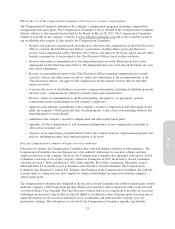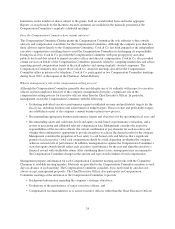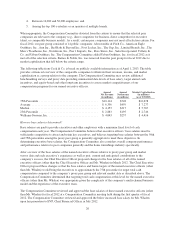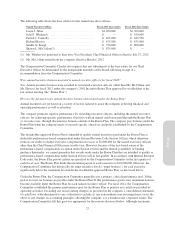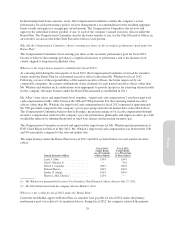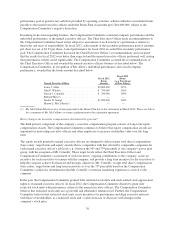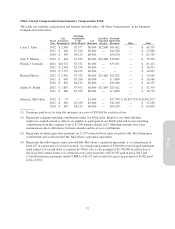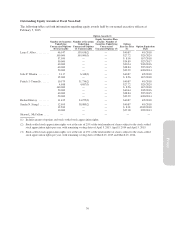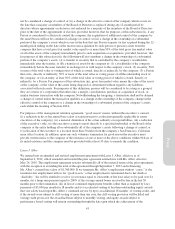Pottery Barn 2012 Annual Report Download - page 127
Download and view the complete annual report
Please find page 127 of the 2012 Pottery Barn annual report below. You can navigate through the pages in the report by either clicking on the pages listed below, or by using the keyword search tool below to find specific information within the annual report.
Executives covered under the Executive Share Ownership Policy are required to retain an amount equal to 50%
of the net after-tax shares received as a result of the release of restricted stock units until the applicable guideline
has been achieved.
Does the company have a policy regarding recovery of past awards or payments in the event of a financial
restatement?
Although we do not currently have a formal policy regarding recovery of past awards or payments in the event of
a financial restatement, we support the review of performance-based compensation following a restatement that
impacts the achievement of performance targets relating to that compensation, followed by appropriate action.
These actions may include recoupment of cash or other incentives, as well as employment actions including
termination. Further, we will implement any recovery policies required by applicable law, including anticipated
SEC rulemaking under the Dodd-Frank Act.
How is the Chief Executive Officer compensated?
Ms. Alber’s fiscal 2012 compensation package was based on:
• A review of the compensation paid to chief executive officers of companies in our proxy peer group;
• Company performance;
• Individual performance; and
• Our general compensation philosophy as described above.
In executive session at its meeting in March 2012, without the Chief Executive Officer present, the
Compensation Committee reviewed Ms. Alber’s base salary. After a discussion of Ms. Alber’s individual
performance and company performance and a review of her total compensation and that of other chief executive
officers in our proxy peer group, the Compensation Committee adjusted her 2012 target total cash compensation
to fall between the 50th and 75th percentile of our proxy peer group. Ms. Alber’s actual bonus payouts for fiscal
2012 are discussed above.
Do the named executive officers have change of control arrangements?
Yes. As described in the section titled “Employment Contracts and Termination of Employment and Change-of-
Control Arrangements” beginning on page 41, all of the named executive officers are eligible for double-trigger
change-of-control benefits pursuant to a Management Retention Agreement or the 2012 EVP Level Management
Retention Plan (“EVP Retention Plan”).
The Compensation Committee approved the Management Retention Agreements that were entered into with the
named executive officers and the EVP Retention Plan so that the company can mitigate the risk of not being able
to retain its named executive officers notwithstanding the possibility of an acquisition of the company. The
Compensation Committee believes these arrangements are necessary to ensure that each named executive officer
is focused on the company’s goals and objectives, as well as the best interests of our stockholders, rather than
potential personal economic exposure under these particular circumstances. Additionally, the Compensation
Committee believes that these agreements and the EVP Retention Plan will provide a smooth transition should
the company undergo such an event.
When deciding on the terms of the Management Retention Agreements and the EVP Retention Plan, the
Compensation Committee consulted with Cook & Co., which provided various suggestions regarding the
potential terms based on competitive market data from our proxy peer group. In considering these potential
terms, the Compensation Committee’s objectives were to: (1) assure we would have the continued dedication and
objectivity of our named executive officers, notwithstanding the possibility of a change of control of the
company, thereby aligning the interests of the named executive officers with those of the stockholders in
connection with potentially advantageous offers to acquire the company; and (2) create a total executive
compensation plan that is competitive with our proxy peer group.
33
Proxy


